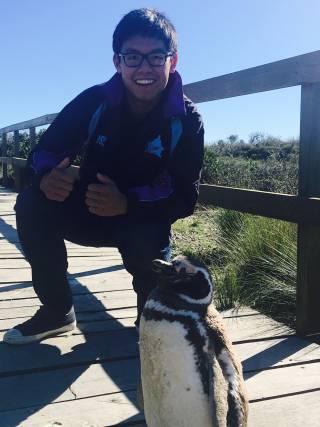Studying abroad is an exciting and highly rewarding, though often challenging experience, and one that will remain with you for the rest of your life.
“If I had to pick one highlight of my degree it would definitely have to be my year abroad. A year abroad has its ups and downs -mine certainly did- and it’s for that reason that I think it’s so important. The year abroad presents you with an opportunity to escape your university bubble without actually ever leaving it. I was able to take my language skills to the next level, while also gaining experiences that I’m sure will serve me for the rest of my life." Ishan Sanjay Deshpande (BA French and Spanish)
The experiences and skills developed while abroad further academic and personal development, cultural and social awareness, provide a foundation for further study and enhance career prospects (The Guardian, The Telegraph).
The Year Abroad is an integral, compulsory element of our four-year degree programmes, which enables students to:

• Develop spoken and written language skills to a near-native level of proficiency
• Gain in-depth knowledge of the culture they are studying
• Become independent and travel more widely
• Get ready for an international workplace
• Make new friends and contacts while learning
Preparations for the Year Abroad begin in Year 2. Students can apply to spend their Year Abroad studying at a partner university, assisting in teaching English in a school abroad via British Council, or organise a work placement for themselves (subject to approval).
Placement Options & Destinations
| Study Placements | British Council placements | Work placements |
SELCS have student exchange programmes with universities in Europe and with Hispanic, Lusophone and Francophone universities in the Americas. This most popular option offers several advantages, including: Students studying two languages and splitting their Year Abroad between two universities must check and ensure the semester dates of the two institutions do not overlap (including examinations). Placements are allocated to students based on their preferences as well as their average on all Year 1 modules. DESTINATIONS (by language): • Dutch • French • German • Italian (Bologna, Firenze, Milano, Roma, Siena) • Portuguese • Scandinavian languages • Spanish | This option is available mostly to students studying one main language (assistantships are usually year-long, however, some placements can last one semester: in Argentina, Austria and Germany). With paid placements and light teaching hours, becoming an English Language Assistant in a school abroad is a unique way to experience another country and develop essential transferable skills. The main source of information about this prestigious and internationally recognisable scheme is the British Council's Language Assistants website. Applicants must be native or native-level speakers of English. Click here for eligibility criteria. As part of their application to British Council, students should specify which country or regions they would prefer to teach in as well as which age-group. Placements may not match preferences exactly, so it is necessary to be flexible. • Assistantships are held either in one school or more than one school in the same vicinity. DESTINATIONS (by language): • French (France, Belgium, Switzerland, Canada, Senegal) • German (Germany, Austria, Switzerland) • Italian (Italy) • Spanish (Spain, Argentina, Chile, Colombia, Ecuador, Mexico) | Depending on a degree programme and a proposed activity, the Year Abroad Tutor may permit a student to take up an independently arranged work placement during their Year Abroad. Work placements are usually voluntary internships (i.e., unpaid) or teaching placements in schools abroad (for example, via 'Teach Argentina' scheme).
|
Fees, Funding and Visas
The central UCL Study Abroad Team will advise students on UCL tuition fees, visa requirements and available funding for their Year Abroad. Please refer to UCL's 'Preparing to go abroad' webpage for more information.
 Assessment
Assessment

The Year Abroad is Pass/Fail only. Although passing the Year Abroad is a programme requirement, it does not contribute towards overall degree classification.
Year Abroad Photo Competition
SELCS students have an opportunity to enter our Year Abroad Photography Competition, submitting photographs from their travels and encounters during the Year Abroad, for the chance to win a prize.
- View our Year Abroad Photo Album and the winning photos
Main Programme Requirements
• All Year Abroad placement arrangements must be finalised by 30th April in the preceding academic year (Year 2).
• Students studying one language spend the whole Year Abroad in a country where the language is spoken.
• Students studying two languages split the Year Abroad between two countries where their target languages are spoken.
• 'One language - one placement' rule: students cannot split their year (if studying one language) or semester (if studying two languages) between two institutions.
• Students splitting their Year Abroad between two countries must check and ensure the dates of the two placements do not overlap.
• Students are required to complete the full term of their allocated university placement, language assistantship or work placement.
• BA Language & Culture and BA Comparative Literature students spend the whole year at a partner university where the main language they are studying is spoken or, if eligible, they may apply for a British Council placement.
• Scandinavian Studies students spend their Year Abroad at a partner university where their target language is spoken.
Student Stories
Our SELCS Society students run a Year Abroad Podcast where they cover all types of placements (study exchange, work placements, British council). The podcast includes questions on how to find accommodation, how to deal with admin, how has Covid affected the Year Abroad, and general advice to students such as "things I wish I would've known before going on my Year Abroad".
 Close
Close

